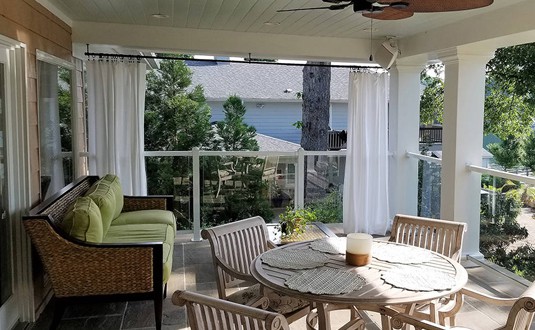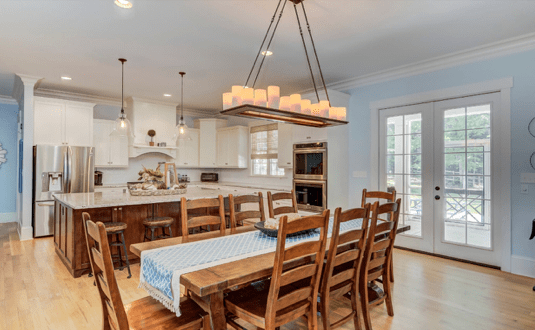You have big ideas about what you want for your home, but you don’t have an infinite budget (who does?) and it’s hard to wrap your head around what different types of renovation projects cost. And there are so many different little decisions in a big project that make a difference to the bottom line that figuring out an estimate on your own seems nearly impossible.
If you’re ready to start planning for your next big renovation project, but still not sure how to tackle creating a budget, here are some steps to get you started.
1. Start with an idea of what you want


Start getting a specific visual of what you want from your project. Beyond deciding on a kitchen remodel or screened porch addition, think about the particular features and changes you want to see in your new kitchen or screened porch. Look up pictures of examples on Pinterest and Houzz and make note of the details you like most and those you don’t care for.
At this stage, decide which features and additions are your must-haves, which are nice-to-haves, and anything specific you don’t want. Having a list of your needs and wants will help you shape the project and figure out what to prioritize once you’re matching your dreams to a specific budget.
2. Figure out what you can afford.
 This is probably the least fun step in the process, but it’s obviously important. To determine what you can afford, look to how much money you have in savings now that you’re willing to commit to the project.
This is probably the least fun step in the process, but it’s obviously important. To determine what you can afford, look to how much money you have in savings now that you’re willing to commit to the project.
For some homeowners, the amount you have saved may be enough, but most people will also need to consider additional financing. Get in touch with a few of the banks and credit unions in your area to find out what financing options for home improvements they offer. The most common financing options for home renovation projects are home equity loans and lines of credit. Find out what type of financing you can get, how much you’ll be approved for, and what interest and repayment terms they offer.
Carefully consider what interest rates and monthly payments you can afford – just because you can be approved for an amount doesn’t mean it’s a good idea for you financially. Based on the combination of savings and the amount you’re ok with borrowing; determine both the maximum amount you can spend on this project, as well as the preferred amount you’re most comfortable spending.
3. Do initial research.
 You want to have some idea of what to expect before you start to talk to contractors, but there’s a real limit to how much you can learn about your particular renovation project doing online research or asking around. Every project is different and trying to price out general costs is tricky when prices can vary so much based on factors like where you live, who you hire, and the current state of your home.
You want to have some idea of what to expect before you start to talk to contractors, but there’s a real limit to how much you can learn about your particular renovation project doing online research or asking around. Every project is different and trying to price out general costs is tricky when prices can vary so much based on factors like where you live, who you hire, and the current state of your home.
But if you spend some time learning what you can about the typical costs of similar projects in your area and the types of unexpected issues people sometimes deal with when tackling a project like yours, you’ll gain a better idea of the right questions to ask once you get started.
This is also the stage to start researching contractors in your area. Check the reviews and testimonials of top local contractors. Choosing who to work with is one of the most important decisions you’ll make.
4. Meet with a contractor
 When you start researching your renovation project, one of the things you’ll quickly learn is how much you don’t know. If you’re not an expert in home renovations, then there are just too many different factors and considerations for you to figure it all out without help.
When you start researching your renovation project, one of the things you’ll quickly learn is how much you don’t know. If you’re not an expert in home renovations, then there are just too many different factors and considerations for you to figure it all out without help.
That’s where a good contractor comes in. An experienced contractor will know all about the relative costs of different materials and features. They’ll know every little cost to factor in and they’ll be aware of the types of unexpected issues that sometimes arise. If you find the right contractor, they’ll be your not-so-secret weapon in creating a realistic budget for your renovation project.
To make sure a contractor has the knowledge and experience to help you create a realistic, useful budget, you have to ask the right questions. Make sure your meeting includes discussion of:
- The material options available – Your contractor should be knowledgeable both about what options you have and the relative merits and downsides of each type of material. They can help you decide when a cheaper material is a good deal, and when it’s really worth going for the higher-cost one.
- The different features and additions you want – Discuss the different ideas you clarified in step one. Your contractor can help you better understand the costs associated with each option you’re considering so you can make a more informed decision about which are really worth it.
- Recommendations they have for ways to cut costs – A good contractor will do their best to help you stay within your budget, even if it means they make less on a smaller project. Ask about suggestions they have for spending less – be it with materials that cost less, discounts they can help you get with local suppliers, or ways to make the project smaller that won’t reduce the enjoyment you’re likely to get from your renovation.
- Any hard-to-plan for issues that may increase costs – This is one of the ways their hard-earned experience is most valuable. You might never know to think about factoring the cost of a fabricator into the price of new granite countertops or the cost of new wiring into a kitchen remodel in an older home, but they will. They can help fill in the gaps of all the costs you don’t have the knowledge to plan for.
Discussing these different factors with a contractor should give you a pretty good idea of their level of knowledge and expertise and, just as importantly, their willingness to work with you to get what you want within the budget you can afford. If you’re trying to decide between a few main options, ask them to provide you estimates on different variations of the project so you can compare.
5. Decide on the details of your project.
Your talk with the contractor should enable you to start bringing the specific details of the project you can afford into view. Figure out if you can (and still want to) actually include everything on your original must-have list in your plans, and figure out which nice-to-haves to keep and which must go. Once you and your contractors pin down the final details of the project, you can determine a realistic budget for what to expect.
There may still be surprises – there almost always are. It’s usually best to include some wiggle room in your budget, enough to cover an extra 10-15% on top of the amount you’re planning on. But when you start with a realistic budget, the likelihood of your project staying within an amount you can afford and being completed the way you want is much higher.
If you’re at the point where you’re ready to talk to a good contractor that can help, get in touch. We always do everything we can to make sure our clients get the best version of the renovation they want for what they can afford.

